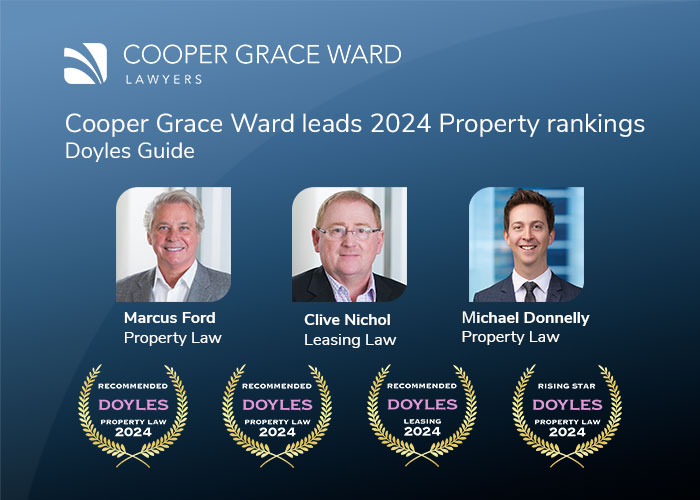In this edition of ‘It depends’, partner Sarah Lancaster talks about whether Part IVA can apply to trust distributions.
Sarah, along with Fletch Heinemann, will be presenting on this topic at our Annual Adviser Conference on 23 and 24 March 2023. Register now to attend in person or online.
Video transcript
Hi and welcome to today’s edition of It Depends I’m Sarah Lancaster, a partner in the tax team at Cooper Grace Ward. And today we’re going to be looking at whether Part IVA can apply to trust distributions. And as always, it depends.
So, the Full Court recently handed down their decision in the Guardian AIT appeal looking at this very issue. So, we’ll explore what happened in Guardian in a little bit more detail.
What were the facts in Guardian?
So, in the 2012 income year, the trustee of AIT Trust, Guardian made a new clean skin corporate beneficiary AITCS presently entitled to the net income of the trust. That company AITCS then drew down on part of its UPE to pay its tax bill in relation to the distribution it received. It then declared a fully franked dividend to Guardian the Trust, who was the sole shareholder of the company. Guardian then set off the balance of the UPE by virtue of the dividend that it had received.
So, in the 2013 income year, that same series of things happened again. Except this time, Guardian also distributed the franked dividend income to Mr. Springer, who was a non-resident for Australian tax purposes.
What did the Full Court decide?
So, the Full Court decided in relation to Part IVA that Part IVA did not apply to the scheme that occurred in relation to the 2012 income year, but it did apply in relation
to the scheme in the 2013 income year.
So, we’ll look at what happened in relation to that application and what the Full Court decided in 2013 in a little bit more detail.
Was there a tax benefit in the 2013 income year?
So, for Part IVA to apply to a scheme, a taxpayer must have obtained a tax benefit, which is a defined term in connection with that scheme. So, this test looks at what might reasonably had occurred if it wasn’t for the scheme.
So, Mr. Springer had the responsibility of satisfying The Court about what he said would have happened had it not been for the scheme. And in those circumstances, what was relevant is that he had to satisfy The Court, that he wouldn’t receive a distribution from Guardian of the unfranked income. He also needed to satisfy The Court about what would have happened instead.
So, the Full Court overturned that decision from Justice Logan and found that a tax benefit did occur in the 2013 income year and relevant to that was the Full Court’s findings that we can’t take into account the tax costs of the scheme and the reasonable alternative to the scheme when looking at whether or not a tax benefit has been obtained.
Was the sole or dominant purpose of the scheme in the 2013 income year to obtain a tax benefit?
So, in the 2012 income year, the Full Court agreed with the first instance decision in finding that there was no sole or dominant purpose to achieve a tax benefit. However, in the 2013 year, the Full Court considered that the sole or dominant purpose of the scheme was to obtain that tax benefit.
So, the Full Court considered when applying the eight factors in section 177D(2) of the 1936 Act that what was critical in these circumstances was the driving form of the transactions. And in the 2013 year, they considered that what had happened in relation to the 2012 income year really set the scene for what later happened in the 2013 income year. And importantly, in relation to the 2013 income year, there was a finding that there was an expectation that AITCS wouldn’t retain the distribution, but would declare a fully franked dividend to Guardian and the benefit of that dividend would ultimately end with Mr. Springer.
Where can I hear more?
Fletch Heinemann and I are looking at the ATO’s use of the avoidance provisions at our upcoming Annual Adviser Conference. It’s taking place on the 23rd and 24th of March in person at the Sofitel and also online.
The ATO’s publications and guidance both in relation to the general anti-avoidance provisions and specific avoidance provisions like section 100A make it clear that these issues are not going away for advisers. So, during the session, we’ll be looking at lessons that advisers can take from the recent cases on these parts of the law and things that we can do to protect our client’s interests.
Hope to see you there.






